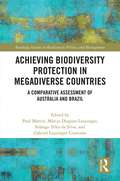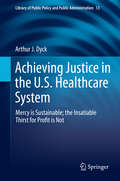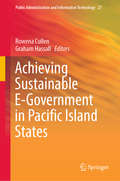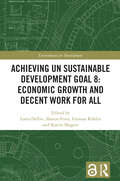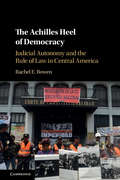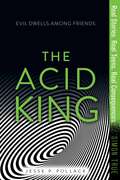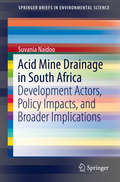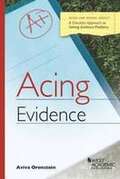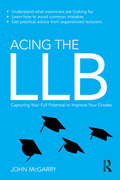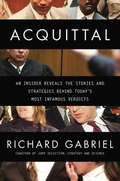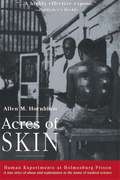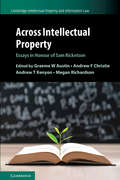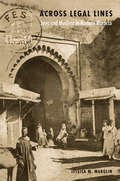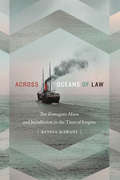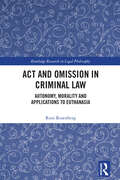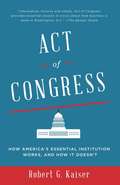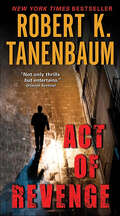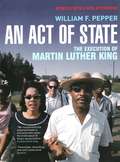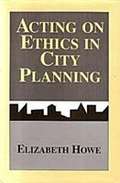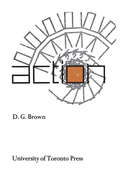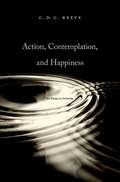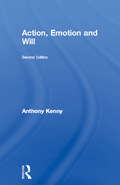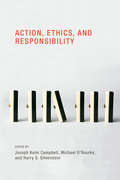- Table View
- List View
Achieving Biodiversity Protection in Megadiverse Countries: A Comparative Assessment of Australia and Brazil (Routledge Studies in Biodiversity Politics and Management)
by Paul Martin Márcia Dieguez Leuzinger Solange Teles da Silva Gabriel Leunziger CoutinhoThis volume systematically analyses why legal doctrines for the protection of biodiversity are not sufficiently effective. It examples implementation in Australia and Brazil, two megadiverse countries with very differing legal and cultural traditions and natural environments. Substantial effort goes into the development and interpretation of legal doctrines for the protection of biodiversity in national and international law. Despite this, biodiversity continues in steep decline. Nowhere is this more evident than in megadiverse countries, such as Australia and Brazil, which possess the greatest number and diversity of animals and plants on Earth. The book covers a wide range of topics, including farming, mining, marine environments, indigenous interests and governance. Achieving Biodiversity Protection in Megadiverse Countries highlights specific causes of underperformance in protecting diverse terrestrial and marine environments. It provides proposals for more effective implementation in these two jurisdictions, relevant to other megadiverse territories, and for biodiversity protection generally. Each chapter was written by teams of Australian and Brazilian authors, so that similar issues are considered across both jurisdictions, to provide both country-specific and generalisable insights. Achieving Biodiversity Protection in Megadiverse Countries will be of great interest to students and scholars of environmental law and governance and biodiversity conservation, as well as policymakers, practitioners and NGOs working in these fields.
Achieving Justice in the U.S. Healthcare System: Mercy is Sustainable; the Insatiable Thirst for Profit is Not (Library of Public Policy and Public Administration #13)
by Arthur J. DyckThis book focuses on justice and its demands in the way of providing people with medical care. Building on recent insights on the nature of moral perceptions and motivations from the neurosciences, it makes a case for the traditional medical ethic and examines its financial feasibility. The book starts out by giving an account of the concept of justice and tracing it back to the practices and tenets of Hippocrates and his followers, while taking into account findings from the neurosciences. Next, it considers whether the claim that it is just to limit medical care for everyone to some basic minimum is justifiable. The book then addresses finances and expenditures of the US health care system and shows that the growth of expenditures and the percentage of the gross national product spent on health care make for an unsustainable trajectory. In light of the question what should be changed, the book suggests that overdiagnosis and medicalizing normal behavior lead to harmful, costly and unnecessary interventions and are the result of unethical behavior on the part of the pharmaceutical industry and extensive ethical failures of the FDA. The book ends with suggestions about what can be done to put the U.S. health care system on the path to sustainability, better medical care, and compliance with the demands of justice.
Achieving Sustainable E-Government in Pacific Island States (Public Administration and Information Technology #27)
by Rowena Cullen Graham HassallThis book analyzes the common set of obstacles to the development and integration of government Information and Communication Technology (ICT) projects and effective e-government initiatives in developing countries. It draws on the expertise and experience of more developed states in the Pacific, notably Australia and New Zealand, both highly rated in global rankings for e-government and active in a variety of e-government development projects across the region. There has been a general failure to identify priorities and align projects with local needs in ICT/e-government projects. Small Island Developing States (or SIDS) present a unique problem in terms of e-government. Not only do they suffer from a common set of barriers to ICT development such as their remoteness, geographical dispersion, moist tropical climates, largely rural populations, and lack of ICT capacity and infrastructure, but are also dependent on external agencies for investment, and must negotiate with powerful donors who have conflicting agendas. E-government is widely regarded as 'transformational', increasing efficiency, productivity, accountability, economic growth, and citizen involvement. But while the governments of SIDS are committed to harnessing ICTs for effective government and economic development, they face major challenges in establishing successful e-government initiatives, due to the problems outlined above, coupled with a lack of HR capacities and appropriate strategies and policies. Drawing on the experience of the states mentioned above, as well as regional quasi-governmental bodies, nongovernmental organizations (NGOs), aid agencies, and the private sector, the book will be of interest to researchers and students in the fields of e-government, public administration, political science, communication, information science, and social media.
Achieving UN Sustainable Development Goal 8: Economic Growth and Decent Work For All (Environment for Development)
by Lotta Dellve Sharon Fonn Gunnar Köhlin Katrin SkagertThis book brings together knowledge on how to achieve the UN Sustainable Development Goal 8, to bring societal change through sustainable economic growth and decent work for all by 2030.At its core is the great challenge of achieving economic growth without compromising the environment, while ensuring respect for fundamental human rights, and in particular the right to employment with equal and safe work conditions. This book provides a critical analysis of Sustainable Development Goal (SDG) 8 in the 2030 Agenda, its targets and indicators, to reveal biases, tensions and contradictions that need to be addressed to achieve this goal and to guide policymaking. The role and potential of academia to contribute to achieving this SDG is scrutinized. Chapters examine and assess specific targets for SDG 8, which includes policies, resource efficiency, youth employment, child labour and sustainable tourism. Higher education institutions’ tools for capacity building are presented, examining how education and academic research can play a role in achieving the SDG 8 targets. Overall, this book offers a synthesis of how research and higher education can make a difference in achieving a complex SDG.This book will be of great interest to academics and professionals working on the United Nations Sustainable Development Goals and can be used as a policymaking guide for 2030 and beyond.
The Achilles Heel of Democracy: Judicial Autonomy and the Rule of Law in Central America
by Bowen Rachel E.Featuring the first in-depth comparison of the judicial politics of five under-studied Central American countries, The Achilles Heel of Democracy offers a novel typology of 'judicial regime types' based on the political independence and societal autonomy of the judiciary. This book highlights the under-theorized influences on the justice system - criminals, activists, and other societal actors, and the ways that they intersect with more overtly political influences. Grounded in interviews with judges, lawyers, and activists, it presents the 'high politics' of constitutional conflicts in the context of national political conflicts as well as the 'low politics' of crime control and the operations of trial-level courts. The book begins in the violent and often authoritarian 1980s in Guatemala, El Salvador, Honduras, and Nicaragua, and spans through the tumultuous 2015 'Guatemalan Spring'; the evolution of Costa Rica's robust liberal judicial regime is traced from the 1950s.
Acid Attacks in Britain, 1760–1975 (World Histories of Crime, Culture and Violence)
by Katherine D. WatsonThis Palgrave Pivot examines the history of the largely urban offence once known as vitriol throwing because the substance most commonly used was strong sulphuric acid, oil of vitriol. A relatively rare form of assault, it was motivated largely by revenge or jealousy and, because it was specifically designed to blind and mutilate, commonly targeted the victim’s face. The incidence of what was thus widely acknowledged to be an exceptionally cruel crime plateaued in the period 1850–1930 amid a sometimes surprisingly lenient legal response, before declining as a result of post-war social changes. In examining the factors that influenced both the crime and its punishment, the book makes an important contribution to criminal justice history by illuminating the role of gender, law and emotion from the perspective of both victim and perpetrator.
The Acid King (Simon True)
by Jesse P. PollackReal stories. Real teens. Real consequences. A murder in a small Long Island town reveals the dark secrets lurking behind the seemingly peaceful façade in this latest installment of the Simon True series.On June 19, 1984, seventeen-year-old Ricky Kasso murdered Gary Lauwers in what local police and the international press dubbed a &“Satanic Sacrifice.&” The murder became the subject of several popular songs, and television specials addressed the issue of whether or not America&’s teens were practicing Satanism. Even Congress got in on the act, debating Satanic symbolism in songs by performers like AC/DC and Ozzy Osbourne. &“The country is in crisis!&” screamed the pundits. After all, it was the height of the Reagan era and Nancy Reagan&’s &“just say no&” campaign was everywhere. But what this case revealed were bigger problems lurking at the heart of suburban America. Ricky Kasso wasn&’t a bad kid, but he was lost. To feel better, he started smoking pot, moving on from that to PCP and LSD. He ended up living on the streets and thinking he had nothing to lose. Gary Lauwers went from being a victim of bullying to using drugs to fit in, and finally robbery—but then he made the mistake of stealing from Ricky, and from that moment on, his fate was sealed. A few months later, Gary went into the woods behind the park with Ricky and two other boys. Only three of them came out. The subsequent police investigation and accompanying media circus turned the village upside down. It shattered the image of an idyllic small town, changed the way neighbors viewed each other, and recast the War on Drugs.
Acid Mine Drainage in South Africa: Development Actors, Policy Impacts, and Broader Implications (SpringerBriefs in Environmental Science)
by Suvania NaidooThis SpringerBrief focuses on Acid Mine Drainage (AMD) in the three basins in the Witwatersrand, South Africa. It provides a background to AMD and its impactsfrom a social science perspective. The South African government and non-governmental organizations' response to AMD is assessed, as well the socio-economic and developmental effects of AMD. This volume, which is based on the author's Master's dissertation at UNISA, involves interviews with a range of experts in the field from government departments, environmental organisations (activists), the private sector (mining), tourism sector and the agricultural sector. The book discusses existing policy documents on AMD and provides recommendations in response to the many socio-economic impacts which have not been fully addressed. A literature review on the global context of AMD is provided. South Africa's water systems are already severely harmed by climate change, different forms of pollution, and poorly managed sanitation systems. For these reasons, the country is becoming increasingly water-stressed and therefore, water will continue to become much scarcer in the future. As a result of AMD's continued impact on South Africa's water systems, as a technical or scientific matter as well as the policy implications for the mining sector, water security and socio-economic sustainability has become a highly contested issue.
Acing Evidence
by Aviva OrensteinThis book offers a succinct, clear, and user-friendly review of federal evidence law. It provides many helpful examples and employs checklists at the end of every chapter. The checklist approach provides an organized way to analyze evidence problems and is particularly helpful for spotting hidden issues. This book's summaries, sample problems, and checklists offer a systematic process for spotting and resolving evidence problems in class, on your evidence exam, on the bar, and in the real world.
Acing the LLB: Capturing Your Full Potential to Improve Your Grades
by John McGarryOften law students don't achieve the results they are capable of, not because of a lack of intellectual ability, but because they haven’t fully understood what is required of them and what they could and should do to achieve higher marks. Acing the LLB will help those students realise their full potential and achieve the very best marks. It explains what lecturers are looking for in a top class answer and is packed with easy-to-follow practical advice that students can use to improve their performance. The author draws upon his own experiences as a lecturer and marker of student work as well as those of colleagues at a range of institutions to offer sound and realistic advice. Engaging, accessible and very readable, this is an ideal guide for anyone starting out on an LLB or for current law students who are looking to improve their grades.
Acquittal
by Richard GabrielOctober 3, 1995. The shocking outcome of the O.J. Simpson trial leaves a nation divided. July 5, 2011. Casey Anthony walks free despite being convicted by millions on cable news and social media. There are times when something as supposedly simple as a just verdict rises to the level of cultural touchstone. Often these moments hinge on logic that seems flawed and inexplicable--until now. In Acquittal, leading trial consultant Richard Gabriel explains how some of the most controversial verdicts in recent times came to be. Drawing on more than twenty-eight years of experience, Gabriel provides firsthand accounts of his work on high-profile cases, from the tabloid trials of Casey Anthony, O.J. Simpson, Phil Spector, and Heidi Fleiss to the political firestorms involving Enron and Whitewater. An expert on court psychology and communications, Gabriel offers unique insights on defendants, prosecutors, judges, witnesses, journalists, and the most important people in the room: the jury. Through play-by-play breakdowns of the proceedings, Gabriel reveals the differences between a court of law and the court of public opinion, the convoluted mechanics behind jury selection, strategies for creating a careful balance of evidence and doubt, and the difficulties of providing a fair trial in the digital age. Along the way, Gabriel raises hard questions about not only the legal system but about the possibility of justice in an oversaturated media landscape. The courtroom is a natural theater. The stakes are high. The roles are all too familiar. And there is always the chance of a twist ending. Acquittal is a revelatory guide to this riveting, frustrating, fascinating world--the most unpredictable drama in American life.
Acres of Skin: Human Experiments at Holmesburg Prison
by Allen M. HornblumAt a time of increased interest and renewed shock over the Tuskegee syphilis experiments, Acres of Skin sheds light on yet another dark episode of American medical history. In this disturbing expose, Allen M. Hornblum tells the story of Philadelphia's Holmesburg Prison.
Across Intellectual Property: Essays in Honour of Sam Ricketson (Cambridge Intellectual Property and Information Law #53)
by Graeme W Austin Andrew F Christie Andrew T Kenyon Megan RichardsonUsing as a starting point the work of internationally-renowned Australian scholar Sam Ricketson, whose contributions to intellectual property (IP) law and practice have been extensive and richly diverse, this volume examines topical and fundamental issues from across IP law. With authors from the US, UK, Europe, Asia, Australia and New Zealand, the book is structured in four parts, which move across IP regimes, jurisdictions, disciplines and professions, addressing issues that include what exactly is protected by IP regimes; regime differences, overlaps and transplants; copyright authorship and artificial intelligence; internationalization of IP through public and private international law; IP intersections with historical and empirical research, human rights, privacy, personality and cultural identity; IP scholars and universities, and the influence of treatises and textbooks. This work should be read by anyone interested in understanding the central issues in the evolving field of IP law.
Across Legal Lines: Jews and Muslims in Modern Morocco
by Jessica M. MarglinA previously untold story of Jewish-Muslim relations in modern Morocco, showing how law facilitated Jews' integration into the broader Moroccan society in which they lived Morocco went through immense upheaval in the nineteenth and early twentieth centuries. Through the experiences of a single Jewish family, Jessica Marglin charts how the law helped Jews to integrate into Muslim society--until colonial reforms abruptly curtailed their legal mobility. Drawing on a broad range of archival documents, Marglin expands our understanding of contemporary relations between Jews and Muslims and changes the way we think about Jewish history, the Middle East, and the nature of legal pluralism.
Across Oceans of Law: The Komagata Maru and Jurisdiction in the Time of Empire (Global and Insurgent Legalities)
by Renisa MawaniIn 1914 the British-built and Japanese-owned steamship Komagata Maru left Hong Kong for Vancouver carrying 376 Punjabi migrants. Chartered by railway contractor and purported rubber planter Gurdit Singh, the ship and its passengers were denied entry into Canada and two months later were deported to Calcutta. In Across Oceans of Law Renisa Mawani retells this well-known story of the Komagata Maru. Drawing on "oceans as method"—a mode of thinking and writing that repositions land and sea—Mawani examines the historical and conceptual stakes of situating histories of Indian migration within maritime worlds. Through close readings of the ship, the manifest, the trial, and the anticolonial writings of Singh and others, Mawani argues that the Komagata Maru's landing raised urgent questions regarding the jurisdictional tensions between the common law and admiralty law, and, ultimately, the legal status of the sea. By following the movements of a single ship and bringing oceans into sharper view, Mawani traces British imperial power through racial, temporal, and legal contests and offers a novel method of writing colonial legal history.
Act and Omission in Criminal Law: Autonomy, Morality and Applications to Euthanasia (Routledge Research in Legal Philosophy)
by Roni RosenbergThis book offers an innovative perspective on the critical distinction between acts and omissions in criminal law, a distinction that runs like a defining thread through all types of criminal offenses.While any act that positively causes a prohibited harm is sufficient for a conviction, an omission that causes the very same harm warrants a conviction only when there is a legal duty to act. This fundamental distinction between acts and omissions is not just relevant to criminal law, but it is also deeply rooted in our moral thinking. Thus, it is commonly argued that the difference between acts and omissions is also applicable to the intuitive moral distinction between active euthanasia, forbidden in most countries, and passive euthanasia, permitted in many countries under certain circumstances. Hence, the significance of this book is threefold: First, it offers a comprehensive, coherent, and systematic discussion of the intersections between the philosophical-moral and the legal-criminal aspects of this fundamental topic. Second, it offers a novel rationale for the distinction between acts and omissions, based on the principle of autonomy. Finally, it demonstrates the influences of the theoretical discussion, on the most significant practical questions.This book will be of interest to researchers, academics and policy-makers working in the areas of criminal law, moral philosophy, and bioethics.
Act Of Congress: How America's Essential Institution Works, And How It Doesn't
by Robert KaiserAn eye-opening account of how Congress today really works—and how it doesn’t— Act of Congress focuses on two of the major players behind the sweeping financial reform bill enacted in response to the Great Crash of 2008: colorful, wisecracking congressman Barney Frank, and careful, insightful senator Christopher Dodd, both of whom met regularly with Robert G. Kaiser during the eighteen months they worked on the bill. In this compelling narrative, Kaiser shows how staffers play a critical role, drafting the legislation and often making the crucial deals. Kaiser’s rare insider access enabled him to illuminate the often-hidden intricacies of legislative enterprise and shows us the workings of Congress in all of its complexity, a clearer picture than any we have had of how Congress works best—or sometimes doesn’t work at all.
Act of Revenge (The Butch Karp and Marlene Ciampi Series #11)
by Robert K. Tanenbaum“Tanenbaum is one lawyer who can write with the best of them.”—Joseph Wambaugh, New York Times bestselling author of Hollywood Hills“Tanenbaum is one hell of a writer.”—New York Post“He has become a master of this genre, and Act of Revenge may be his most exciting and best effort to date.”—Vincent Bugliosi, New York Times bestselling author of Helter SkelterA classic, pulse-pounding thriller from the legendary Robert K. Tanenbaum, Act of Revenge plunges the popular author’s long-running series protagonists, New York City Chief Assistant District Attorney Butch Karp and family, into the lethal heart of a bloody turf war between the Mafia and ruthless Chinese gangsters. An elite member of America’s contemporary crime fiction and thriller royalty—a master whose work stands tall among the novels of John Sanford, Lee Child, Robert Crais, and Brad Meltzer—Tanenbaum entertains magnificently, displaying true storytelling muscle with Act of Revenge.
An Act of State: The Execution of Martin Luther King
by William F. PepperMartin Luther King Jr was a powerful and eloquent champion of the poor and oppressed in the US, and at the height of his fame in the mid-sixties seemed to offer the real possibility of a new and radical beginning for liberal politics in the USA. However,in 1968, he was assassinated; the movement for social and economic change has never recovered. The conviction of James Earl Ray for his murder has never looked even remotely safe, and when William Pepper began to investigate the case it was the start of a twenty-five year campaign for justice. At a civil trial in 1999, supported by the King family, seventy witnesses under oath set out the details of the conspiracy Pepper had unearthed: the jury took just one hour to find that Ray was not responsible for the assassination, that a wide-ranging conspiracy existed, and that government agents were involved. An Act of State lays out the extraordinary facts of the King story--of the huge groundswell of optimism engendered by his charismatic radicalism, of how plans for his execution were laid at the very heart of government and the military, of the disinformation and media cover-ups that followed every attempt to search out the truth. As shocking as it is tragic, An Act of State remains the most compelling and authoritative account of how King’s challenge to the US establishment led inexorably to his murder.
The ACTA and the Plurilateral Enforcement Agenda
by Pedro Roffe Xavier SeubaThe Anti-Counterfeiting Trade Agreement (ACTA) is the most important effort undertaken to lay down a plurilateral legal framework for the enforcement of intellectual property rights. With the view to learn more about the origins of this treaty, the process leading to its conclusion and its implications for law making in this field, The ACTA and the Plurilateral Enforcement Agenda: Genesis and Aftermath analyses in great depth both the context and the content of the agreements. In order to attain this objective, a large and diverse group of experts - renowned scholars, policy makers and civil society actors - who represent different perspectives on the necessary balance between intellectual property enforcement and other economic and social interests have been gathered together. This book is the most comprehensive analysis of ACTA, and of its relation with ongoing initiatives to improve enforcement of intellectual property and norms pertaining to a range of international legal regimes, conducted so far.
Action
by D. G. BrownProfessor Brown in this volume discusses one of the most difficult questions in metaphysics, "what is action?" His analysis proceeds along three main lines of thought: the point of view of the agent, the primacy of inanimate action, and the pervasiveness of explanatory insight in the description of action. In the spirit of recent work on practical reasoning, he takes the central fact about human action to be the existence of the point of view, and considers the agent's relation to his own body, Professor Brown argues that the concept of human action is best understood through that of inanimate action, such as the action of wind on trees or an axe on wood. His analysis takes inanimate action as fundamental, and defends it against the popular theory that it is an anthropomorphic projection. Human action is indeed unique. But it is also Professor Brown's thesis that the classical empiricist search for the brute fact of our own agency yields no more than incidental insights into its nature; introspection does not replace the analysis of human action.The analysis in this essay caters for inanimate action as well as for the uniqueness of human action. The key to an analysis complex enough to cover both is the notion of "attributability," which Professor Brown regards as providing "an Aristotelian extension of a Humean approach to causation." Explanation by reference to the soul exploits the point of view of the rational agent. In this way, both human and inanimate action are exhibited as natural phenomena the descriptions of which are pervaded by explanatory insight.The book as a whole gives an account of action in which the peculiarities of human action find their place in nature. It does not enter on questions of ethics, but remains with concepts common to morality, psychology, and history. There are incidental discussions of deliberation, psychokinesis, casual necessity, the agent's knowledge of his action, and responsibility. Here is a controversial theory of action supported by careful argument. Professor Brown's writing is both ambitious in scope and attentive to conceptual detail, and offers a valuable contribution to one of the liveliest contemporary debates in philosophy.
Action, Contemplation and Happiness: An Essay on Aristotle
by Reeve C. D. C.The notion of practical wisdom is one of Aristotles greatest inventions. It has inspired philosophers as diverse as Martin Heidegger, Hans-Georg Gadamer, Elizabeth Anscombe, Michael Thompson, and John McDowell. Now a leading scholar of ancient philosophy offers a challenge to received accounts of practical wisdom by situating it in the larger context of Aristotles views on knowledge and reality. That happiness is the end pursued by practical wisdom is commonly agreed. What is disputed is whether happiness is to be found in the practical life of political action, in which we exhibit courage, temperance, and other virtues of character, or in the contemplative life, where theoretical wisdom is the essential virtue. C. D. C. Reeve argues that the dichotomy is bogus, that these lives are in fact parts of a single life, which is the best human one. In support of this view, he develops innovative accounts of many of the central notions in Aristotles metaphysics, epistemology, and psychology, including matter and form, scientific knowledge, dialectic, educatedness, perception, understanding, political science, practical truth, deliberation, and deliberate choice. These accounts are based directly on freshly translated passages from many of Aristotles writings. "Action, Contemplation, and Happiness" is an accessible essay not just on practical wisdom but on Aristotles philosophy as a whole.
Action, Emotion and Will: 1963 Edition
by Anthony Kenny Dr Anthony KennyAction, Emotion and Will was first published in 1963, when it was one of the first books to provoke serious interest in the emotions and philosophy of human action. Almost forty years on, Anthony Kenny's account of action and emotion is still essential reading for anyone interested in these topics.The first part of the book takes an historical look at the emotions in the work of Descartes, Locke and particularly Hume. In the second part, Kenny moves on to discuss some of the experimental work on the emotions by 20th Century psychologists like William James. Separate chapters cover feelings, motives, desire and pleasure. This edition features a brand new preface by the author.
Action, Ethics, and Responsibility (Topics in Contemporary Philosophy)
by Joseph Keim Campbell Michael O'Rourke Harry S. SilversteinLeading philosophers explore responsibility from a variety of perspectives, including metaphysics, action theory, and philosophy of law.Most philosophical explorations of responsibility discuss the topic solely in terms of metaphysics and the "free will" problem. By contrast, these essays by leading philosophers view responsibility from a variety of perspectives—metaphysics, ethics, action theory, and the philosophy of law. After a broad, framing introduction by the volume's editors, the contributors consider such subjects as responsibility as it relates to the "free will" problem; the relation between responsibility and knowledge or ignorance; the relation between causal and moral responsibility; the difference, if any, between responsibility for actions and responsibility for omissions; the metaphysical requirements for making sense of "collective" responsibility; and the relation between moral and legal responsibility. The contributors include such distinguished authors as Alfred R. Mele, John Martin Fischer, George Sher, and Frances Kamm, as well as important rising scholars. Taken together, the essays in Action, Ethics, and Responsibility offer a breadth of perspectives that is unmatched by other treatments of the topic.ContributorsJoseph Keim Campbell, David Chan, Randolph Clarke, E.J. Coffman, John Martin Fischer, Helen Frowe, Todd Jones, Frances Kamm, Antti Kauppinen, Alfred R. Mele, Michael O'Rourke, Paul Russell, Robert F. Schopp, George Sher, Harry S. Silverstein, Saul Smilansky, Donald Smith, Charles T. Wolfe
